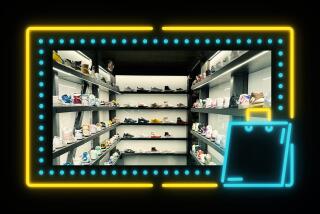On the Flip Side : Record Stores Spin Increased Profits With Videocassette Sales
- Share via
Licorice Pizza’s very name is a euphemism for records, but the shelves of the Los Angeles chain’s seven San Diego County stores these days are filled mostly with videocassettes.
Similarly, the 16 San Diego County Wherehouse Records stores, once regarded as the 7-Eleven of the retail record trade, now devote more than half their floor space to movie rentals.
It has been five years since the dawning of the Video Age, and the nation’s big record chains have seen the light.
Since 1981, each Licorice Pizza and Wherehouse has maintained as many as 500 different movies on VHS and Beta videocassettes, which rent for $2 to $2.50 per night.
And, so far, the results have been impressive, as the public’s growing fascination with video surpasses its interest in buying records.
Four years ago, record sales accounted for 60% of Licorice Pizza stores’ annual gross revenue--exactly twice their share today, according to Licorice Pizza marketing director Randy Gerston.
“We’ve already changed our name from Licorice Pizza Records and Tapes to Licorice Pizza Music and Video,” said Gerston. “And we’re also taking steps to change our logo so that the ‘Licorice Lady’ is carrying other products besides records.”
At the Wherehouse, Richard H. Chapin, senior vice president and chief financial officer, said that movie rentals helped push the chain’s net income from $928,000 in 1982 to more than $6 million for the fiscal year that ended June 30.
“We have established a record level of profitability in each of the last three years, and the advent of the movie rental business is primarily responsible,” Chapin said. “More than 25% of our gross last year came from video, and with a huge number of new VCRs being brought into American homes every year, we expect that percentage to increase even further.”
Theft Losses
However, shoplifters who have stolen rental videocassettes have put a dent in Wherehouse revenues. Shoplifting contributed to a 28% drop in the company’s first-quarter profits in fiscal 1986, Chapin said. In October and November, the Wherehouse chain spent more than $1.5 million to install electronic surveillance systems in all 86 of Wherehouse’s 160 stores that rent movies.
While chain stores have steadily drifted away from record sales, independent record stores around the county have been busy filling the void--with equally impressive results.
In just the last year, Off the Record in East San Diego has more than doubled its floor space, said co-owner Rich Horowitz. And at Blue Meannie Records in El Cajon, record sales are up 20%, said owner Garry Shrum.
“The fact that the chains are much less interested in records and much less interested in helping record customers has really been a great boon to us,” Horowitz said. “There are a lot of disenchanted record collectors out there, and they’re coming to us.
“There’s no way video will ever replace records, in our eyes. And from the growth we’ve experienced this last year alone, there are a lot of people out there who feel the same way.”
Blue Meannie’s Shrum agrees.
“We still carry imports, 12-inch singles and other items that the chains had to drop to make room for the videos,” Shrum said. “And we still special order records we don’t have in stock and do other customer services that the chains just don’t seem to bother with anymore.”
Gerston and Chapin, however, deny Shrum’s contention that their stores have cut down on inventory and service to accommodate videotapes.
“We haven’t cut down on records,” Gerston said. “As we opened our video sections, we increased the size of our stores. As a result, the average Licorice Pizza is now 3,500 square feet, as opposed to 2,800 square feet five years ago.
“And we still have as many records as we did before, although the reason you might see less of them on the floor is that a lot of them are now on compact disc.”
Similarly, Chapin said the three San Diego Wherehouses that opened last year--and the four scheduled to open this year--are “double the size of existing stores.”
“We haven’t switched from music to video,” Chapin said. “We’ve simply added video to our selection of music. In fact, we’ve found that our movie rental business actually helps record sales, because it brings more people through the stores.
“In many cases, movie rental customers will stop on the way out and buy some records as well, almost as an afterthought.”
More to Read
Inside the business of entertainment
The Wide Shot brings you news, analysis and insights on everything from streaming wars to production — and what it all means for the future.
You may occasionally receive promotional content from the Los Angeles Times.










